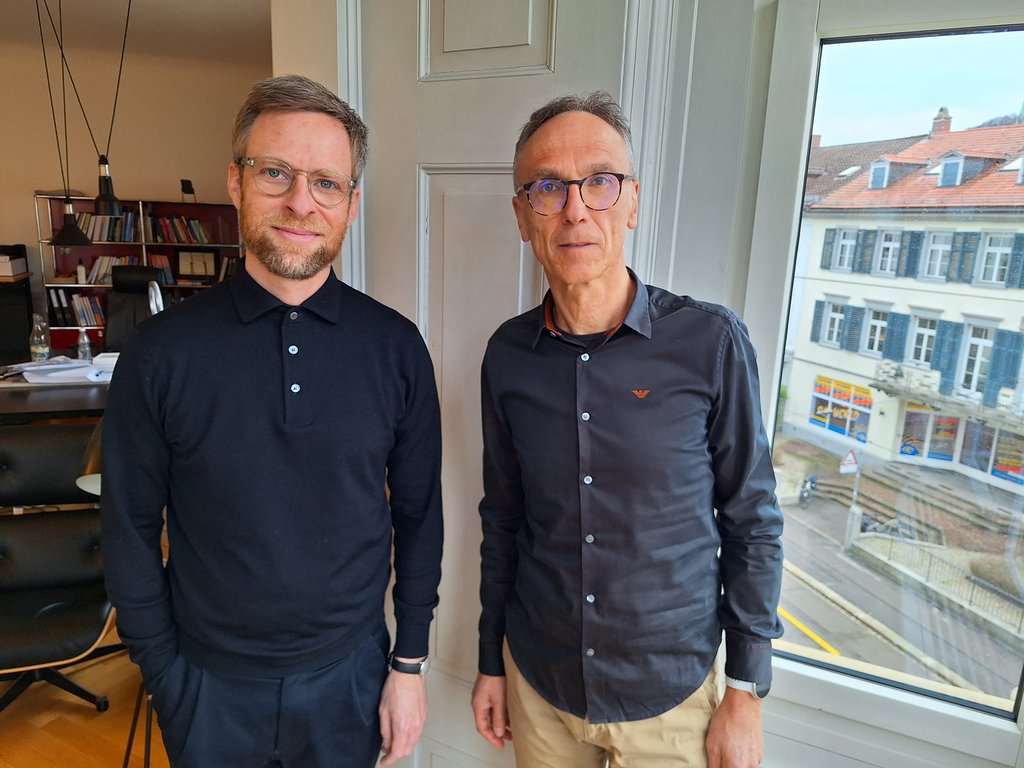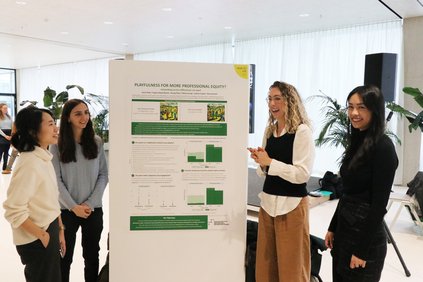Research - 26.03.2024 - 09:24
HSG researchers pursue the vision of sustainable mobility
Mobility should be sustainable without having to be restricted: Researchers at the HSG Institute for Mobility are working on this. They conduct interdisciplinary research and implement concrete projects with transport companies, businesses and cities.

Philip Scharfenberger and Andreas Hermann from the Institute for Mobility at the University of St.Gallen
When the city of Paris announced at the beginning of February 2024 that it would triple the parking fees for SUVs, HSG mobility expert Andreas Herrmann (on the right in the picture above) told Radio SRF: "Paris wants to become a model city for the mobility of the future." As a researcher, Herrmann has been fully focussed on new mobility for several years. As a marketing expert, he had previously implemented various projects with car manufacturers. "Over time, I realised that our current form of mobility - especially mobility by car - needs to be developed." He quotes a statistic: today, an average of 1.1 people sit in a car when commuting. "Imagine if you could double this utilisation rate - what space that would free up in cities!" he says, his eyes shining. He is driven by the question of how mobility can become sustainable without having to restrict it.
Focus on ecological and social aspects
Mobility has a technical side, but at the same time it enables prosperity, relationships and freedom. "We are conducting research in a field fraught with conflict. For example, fans cycling and car enthusiasts are at odds with each other," says Herrmann. What is needed, however, is a holistic approach that incorporates of all modes of transport. In 2021, Herrmann founded the Institute for Mobility (HSG-IMO) together with HSG marketing professor Torsten Tomczak and HSG lecturer Philipp Scharfenberger (on the left in the picture above) in order to promote this way of thinking.
Scharfenberger, also vice-director of IMO-HSG, tells us that he hiked from St.Gallen to Vaduz over the weekend. That's around 50 kilometres, past the Alpstein and through the St.Gallen Rhine Valley. Scharfenberger says with a laugh: "Walking is definitely one of my favourite forms of mobility. Founding the institute has enabled him and the team to "become even more involved in important current social and ecological developments."
Improving cycling and micromobility in St.Gallen
The IMO team is focussing on international and regional topics: In the "Multimodal networked" project, it is testing how public transport and micromobility (e-scooters and e-bikes in the sharing model) can be better networked in the St.Gallen region. In addition to SBB and Ostwind, the city of St.Gallen and the St.Gallen-Lake Constance agglomeration as well as the scooter and bike rental company TIER are also involved. Specifically, additional hubs for TIER scooters and bikes are to be set up in the St.Gallen region. Users will also be able to book special options for the combined use of public transport and TIER.
"We will evaluate the impact of these offers on user numbers in autumn 2024," says Matthias Brüning, who is accompanying the project as a Ph.D. student. The fact that he can collaborate with partners from the realm of working life for his doctorate and that concrete results will be visible afterwards was an important reason for him to decide in favour of a doctorate at IMO-HSG.
Doctoral student Luisa Stöhr also says: "We are buildong up a network inside and outside the university during my work on my doctoral thesis and am gaining valuable experience in managing projects." She is conducting research as part of the "Future Mobility Lab" initiated by the IMO-HSG. In this lab, companies such as VW, SBB, Deutsche Bahn, Amag and the car-sharing provider Mobility are working together with the IMO-HSG to implement an academic programme; in 2023, they jointly accompanied 20 households over four months as they switched to more sustainable transport behaviour. In 2024, companies from various sectors that want to make their employees' mobility more sustainable will be supported. PhD student Tamara Wisser is conducting research at the IMO-HSG on how model regions can be designed to successfully test and develop mobility innovations. Such regions are characterised by close cooperation between public and private stakeholders and by the pursuit of social (rather than purely technical) goals.
In 2024, the work of the IMO-HSG will also become visible in the city of St.Gallen: Together with the city administration, HSG researchers will analyse the cycling infrastructure in St.Gallen and develop various measures to improve it.
30,000 autonomous vehicles as a "game changer"
For its various projects, the IMO-HSG works with railway companies, transport companies, car manufacturers, cities, social organisations and universities worldwide. "This diversity of perspectives on mobility is what makes our work so interesting," says Scharfenberger. The institute, with an interdisciplinary and entrepreneurial structure, makes it possible to effectively implement ideas with a wide variety of partners.
"If the institutes didn't exist, the HSG would be just one of many small universities," says mobility researcher and HSG Professor Herrmann. Institutes such as the IMO-HSG make a major contribution to the fact that HSG is around 50 per cent self-financed with offerings in executive education as well as consulting and research for external parties. "As researchers in institutes, this also motivates us to orientate our research towards practical questions and to work on socially relevant topics," says Herrmann. "Many researchers also decide to come to HSG because of the freedom in focussing on practical topics."
One senses that mobility also has an emotional significance for the researchers. Which developments do they find particularly exciting at the moment? He is particularly fascinated by the combination of IT and mobility, says Scharfenberger. "I think powerful apps that connect relevant modes of transport in a user-friendly and versatile way - that's an important field of development and there's still plenty of room for innovation." Herrmann adds: "Oslo has announced that a fleet of 30,000 self-driving vehicles will be on the road in the city centre by 2030. These will largely replace private cars - that would be a real game changer."
More articles from the same category
This could also be of interest to you
Discover our special topics
















